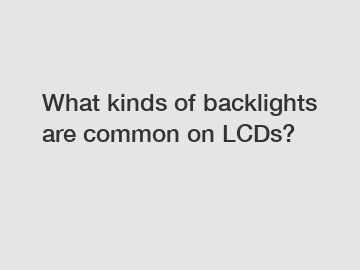What kinds of backlights are common on LCDs?
LCDs or Liquid Crystal Displays have become the standard in modern electronic screens, from smartphones to computer monitors. These displays are known for their vibrant colors, high resolution, and slim profiles. But have you ever wondered what makes these screens so bright and clear? The answer lies in the backlighting technology used. In this article, we will explore the different kinds of backlights that are commonly used on LCDs.
The primary function of a backlight is to illuminate the liquid crystals present in the LCD display to create an image. This illumination is achieved through different types of backlighting technologies. Let's take a closer look at some of the common types:
1. CCFL (Cold Cathode Fluorescent Lamp) Backlight:

This was the traditional backlight technology used in LCDs. A CCFL backlight consists of a series of tiny fluorescent tubes placed along the edges or behind the LCD panel. These fluorescent tubes are responsible for emitting white light, which then passes through the LCD pixels to produce the desired colors. CCFL backlights have been widely used due to their relatively low cost and availability, especially in older LCD monitors and laptops.
2. LED (Light Emitting Diode) Backlight:
With advancements in technology, LED backlights have become the most popular choice for LCD displays. Instead of fluorescent tubes, LED backlights use an array of tiny LEDs placed along the edges or directly behind the LCD panel. LEDs have several advantages over CCFL, including greater energy efficiency, better color reproduction, and a longer lifespan. LED backlights also allow for better control of brightness levels, resulting in improved contrast ratios and deeper blacks.
3. Edge-Lit LED Backlight:
Edge-lit LED backlights are a variation of LED backlighting, where the LEDs are placed along the edges of the screen. These LEDs are then diffused to evenly illuminate the LCD panel. Edge-lit LED backlights are commonly found in slim TVs and monitors. While they are thinner and lighter than their direct-lit counterparts, they may have some drawbacks, such as slightly uneven lighting or less uniform brightness across the screen.
4. Direct-Lit LED Backlight:
Direct-lit LED backlights, also known as full-array backlights, consist of a grid of LEDs placed directly behind the LCD panel. This configuration allows for better control over local dimming, resulting in improved contrast and deeper blacks. Direct-lit backlights are often found in high-end LCD TVs and computer monitors. They are more expensive to produce but offer superior picture quality compared to edge-lit backlights.
In recent years, there have been further advancements in backlighting technology. Manufacturers have introduced technologies like OLED (Organic Light Emitting Diode) and Mini-LED backlights, which offer even better image quality and contrast ratios. OLED displays do not require a separate backlight as each pixel emits its own light, resulting in true blacks and infinite contrast. Mini-LED backlights, on the other hand, use an array of smaller LEDs placed behind the LCD panel, providing enhanced control over dimming and better overall image quality.
In conclusion, the type of backlight used in an LCD screen significantly impacts its performance and image quality. While CCFL backlights were prevalent in older LCD displays, LED backlighting has become the industry standard due to its energy efficiency, color accuracy, and long lifespan. Whether it's edge-lit or direct-lit LED backlights, these technologies offer superior performance over their predecessors. As technology continues to evolve, we can expect even more advancements in backlighting technology, resulting in even better LCD displays.
If you have any questions or would like to know more about LCD backlights, feel free to contact us.
Are you interested in learning more about Dianguang, Fuel Dispenser Liquid Crystal Module Manufacturer, Fuel Dispenser Liquid Crystal Module Manufacturer? Contact us today to secure an expert consultation!
225
0
0

Comments
All Comments (0)